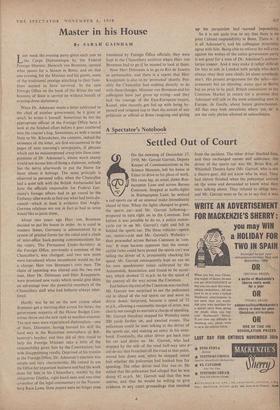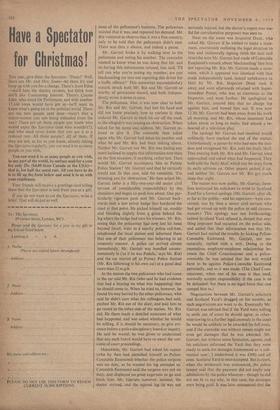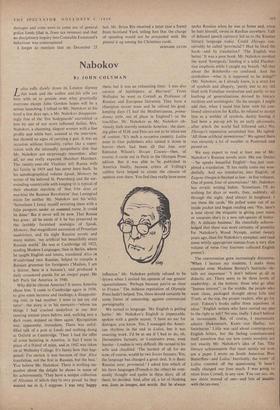A Spectator's Notebook
Settled Out of Court
ON the morning of December 17, 1958, Mr. Gerald Garratt, Deputy Keeper of Communications at the Science Museum, left his home at Esher to drive to his place of work. His route lay, as usual, down Roe- hampton Lane and across Barnes Common. Stopped at traffic-lights in Roehampton Lane, he noticed a red sports car of an unusual make immediately ahead of him. When the lights changed to green, the sports car—and Mr. Garratt following— prepared to turn right on to the Common. lust before it was possible to do so, a police motor- cycle cut in on Mr. Garratt's right and fell in behind the sports car. The three vehicles—sports car, motor-cycle and Mr. Garratt's Wolselley- then proceeded across Barnes Common in 'con- voy.' It soon became apparent that the motor- cyclist (who could have passed the sports car) was tailing the driver of it, presumably checking his speed. Mr. Garratt consequently kept an eye on his own speedometer (since calibrated by the Automobile Association and found to be accur- ate), which showed 32 m.p.h. to be the speed of the convoy all the way across the Common.
Just before the end of the Common was reached, Mr. Garratt was surprised to see the policeman cut in ahead of the red sports car and wave its driver down. Surprised, because a speed of 32 m.p.h., allowing a reasonable margin of error, was clearly not enough to warrant a charge of speeding. Mr. Garratt therefore stopped his Wolseley some 200 yards farther on, and awaited events. The policeman could be seen talking to the driver of the sports car, and making an entry in his note- book. Eventually, the other driver got back into his car and drove on. Mr. Garratt, who had stopped by the side of the road half-way into a-- cul-de-sac that branched off the road at that point, waved him down and, when he stopped, asked him whether the policeman had booked him for speeding. The other driver said that was so. He added that the policeman had alleged that he was doing 42 m.p.h. Mr. Garratt said that this was untrue, and that he would be willing to give evidence in any court proceedings that resulted from the incident. The other driver thanked him, and they exchanged names and addresses; the driver of the sports car was Mr. Brian Rix, of Whitehall Theatre fame (Mr. Garratt, who is not a theatre-goer, did not know who he was). They had almost finished when the policeman arrived on the scene and demanded to know what they were talking about. They refused to oblige him, and Mr. Garratt went so far as to say that it was none of the policeman's business. The policeman insisted that it was, and repeated his demand. Mr.
Rix ventured to observe that it was a free country, only to be told that the policeman didn't care. There was then a silence, and indeed a pause.
Mr. Garratt broke it by walking over to the policeman and noting his number. The constable wanted to know what he was doing that for, and on having this information refused, too, said, 'I'll tell you why you're noting my number; are you blackmailing me into not reporting this driver for a traffic offence?' This somewhat unconstabulary remark struck both Mr. Rix and Mr. Garratt as worthy of perManent record, and both indepen- dently wrote it down at once.
The policeman, who, it was now clear to both Mr. Rix and Mr. Garratt, had lost his head and did not know precisely how to retrieve it, then ordered Mr. Garratt to back his car off the road, as (he alleged) it was causing an obstruction. When asked for his name and address, Mr. Garratt re- fused to give it. The constable then asked again why Mr. Garratt had taken his number and what he and Mr. Rix had been talking about. Neither Mr. Garratt nor Mr. Rix was feeling any more inclined to supply this information now than on the first occasion; if anything, rather less. Then would Mr. Garratt accompany him to Putney Police Station? Mr. Garratt said that he certainly would not. In that case, said the constable, 'I'm arresting you for obstruction.' He then seized Mr. Garratt (who is a fifty-two-year-old senior civil servant of considerable respectability) by the shoulders and began to push him about. One par- ticularly vigorous push sent Mr. Garratt back- wards over a low privet hedge that bordered the road at that point. He picked himself up, muddy and bleeding slightly from a graze behind the leg where the hedge had torn his trousers. Mr. Rix, seeing that the policeman had now lost his head beyond recall, went to a nearby police call-box, telephoned the local station and informed them that one of their policemen was behaving in an unseemly manner. A police car arrived almost immediately, Mr. Garratt was bundled uncere- moniously in ('as if he was Podola,' says Mr. Rix) and the car moved off to Putney Police Station (Mr. Rix following in his own car) at a good deal more than 32 m.p.h.
At the station the two policemen who had come in the car told. Mr. Rix (who said he had evidence that had a bearing on what was happening) that he should come in. When he tried to, however, he found his way barred by the other policeman, who said he didn't care what his colleagues, had said, pushed Mr. Rix out of the door, and told him to go round to the other side of the station. Mr. Rix did. He there made a detailed statement of what had happened, and was asked whether he would be willing, if it should be• necessary, to give evi- dence before a police disciplinary board or inquiry. He said he would; he was given to understand • that any such board would have to await the out-
come of court proceedings.. .
Meanwhile, Mr. Garratt had asked his captor (who by then had identified himself as Police- Constable Eastmond) whether the police surgeon was on duty, as he .wanted his leg attended to. Constable Eastmond said the surgeon was not on duty, and displayed no great eagerness to go and fetch him. Mr. Garratt,, however, insisted, the doctor arrived, and the injured leg. (it was not seriously injured, but the doctor's report was use- ful for corroborative purposes) was seen to.
Next on the scene was Inspector Doak. who asked Mr. Garratt if he wished to make a state- ment, courteously outlining the legal situation to him and incidentally signing (with the date and time) the note Mr. Garratt had made of Constable Eastmond's remark about 'blackmailing' him into not reporting Mr. Rix. Mr. Garratt made a state- ment, which it appeared was identical with that made independently (and, indeed unbeknown to him) by Mr. Rix. Inspector Doak took it away and soon afterwards returned with Super- intendent Potter, who was as courteous as the Inspector, and went further. He apologised to Mr. Garratt, assured him that no charge lay against him, and bowed him out. It was now 12.30; Mr. Garratt had been away from his work all morning, and Mr. Rix, whose statement had taken about as long to make, had missed a re- hearsal of a television play.
The apology Mr. Garratt had received would ordinarily have marked the end of the matter. Unfortunately, a passer-by who had seen the inci- dent and recognised Mr. Rix, told the Daily Mail. That evening both•Mr. Rix and Mr. Garratt were approached and asked what had happened. They both told the Daily Mail, which ran the story from its early editions on. Other papers picked it up, and neither Mr. Garratt nor Mr. Rix got much sleep that night.
The matter was now public. Mr. Garratt there- fore instructed his solicitors to write to Scotland ,Yard.for a formal apology. (Mr. Garratt, after all, as far as the public—and his superiors—were con- cerned, was by then a senior civil servant who had got mixed up with the police in odd circum- stances.) This apology was not forthcoming; indeed Scotland Yard refused it, denied that any- thing improper had occurred on the police side, and added that their information was that Mr. Garratt had started the trouble by kicking Police- Constable Eastmond. Mr. Garratt, not un- naturally, replied with a writ. Owing to the anomalous employer-employee relationship be- tween the Chief. Commissioner and a police- constable, he was advised that the writ would have to be against Police-Constable Eastmond personally, and so it was made. (The Chief Com- missioner, when one of his men is thus stied, normally accepts responsibility if the case is to be defended; but there is no legal force that can compel him to.)
Negotiations between Mr. Garratt's solicitors and Scotland Yard's dragged on for months, as such negotiations are wont to do. Eventually Mr. Garratt was advised that if the Yard were willing to settle out of court he should agree, as other- wise (owing to a further legal anomaly in the case) he would be unlikely to be awarded his full costs, and if the constable was without means might not even get damages that he was awarded. Mr. Garratt, not without some hesitation, agreed, and his solicitors informed the Yard that they were ready to settle for damages (announced as 'a sub- stantial sum'; I understand it was £300) and all costs. Scotland Yard at once accepted. BUt in court, when the settlement was announced, the police lawyer said that the payment did not imply any admissions by the police whatever—though he did not see fit to say why, in that case; the damages were being paid. It was later announced that the damages and costs were to come out of general/ police funds (that is, from tax revenue) and that no disciplinary inquiry into Constable Eastmond's behaviour was contemplated.
I forgot to mention that on December 25 last, Mr. Brian Rix received a letter (not a form) from Scotland Yard, telling him that the charge of speeding would not be proceeded with. He pinned it up among his Christinas cards.
BERNARD LEVIN








































 Previous page
Previous page